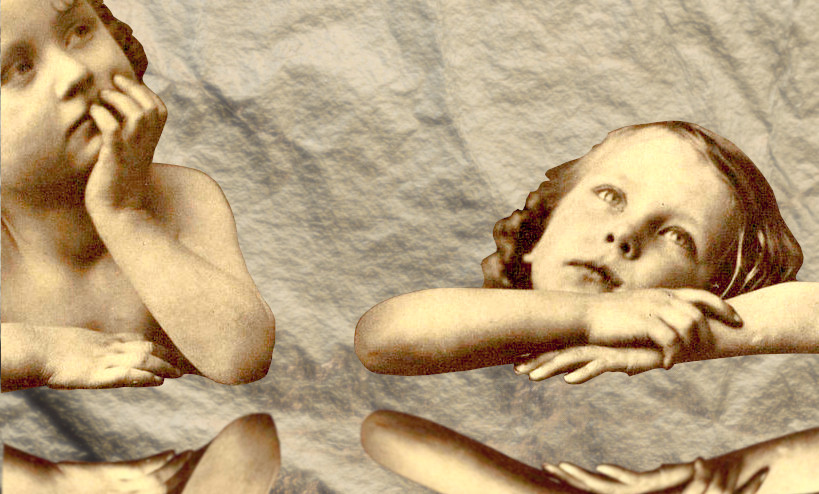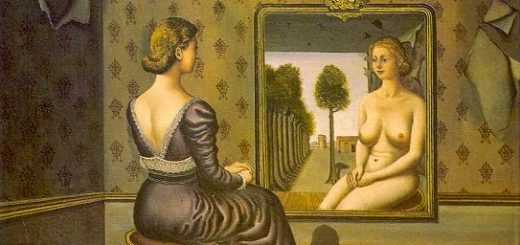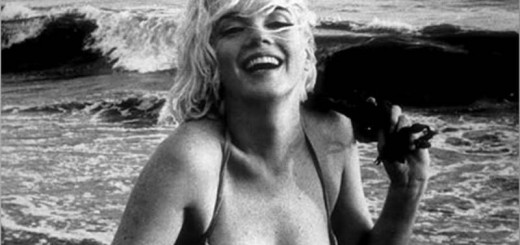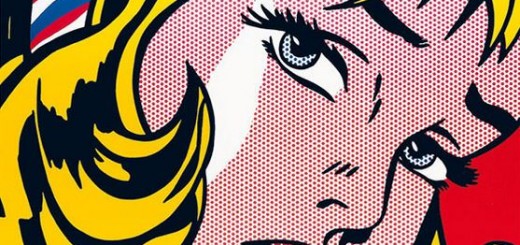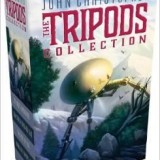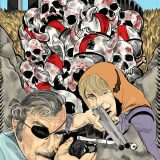When night’s shadows fall
Usually Peppi had guests for Christmas, and so he would come to visit them, knowing they would not come to him. They would hear, if it were fine enough for them to be out in the garden, his boots crunching through the snow and his rough old voice singing, in French, a carol about the baby Jesus putting out His hands in winter and making the trees bud and the flowers bloom. He would have his presents for them, and for Mummy, and for the brothers when they were there; and they would give him presents in return, and he would drink a glass of wine before returning to the Chalet Russe.
But this year Jeanne-Marie had told them there were no guests for Christmas, and so, when it was eleven o’clock and Peppi had not yet visited them, they put on their heavy coats and took their presents and went out into the snow. They had made the presents themselves: Jane had worked a sampler with a verse of poetry on it, and Joseph, who was less clever, had made a painting of the Chalet Russe, as one saw it from the balcony of their bedroom, and put it in the frame of an old picture. They carried them carefully as they went up through the garden, ducking when the hazel branches spilled down small cataracts of snow on them, and having to clear snow off the top of the little gate before they could find the latch. On the other side there were the terraces of whiteness dipping down to the house, the house itself white and still.
‘Look,’ Jane said. ‘There is no smoke from the chimney.’
Joseph stared at the bare outline of the snow-covered roof.
‘Perhaps Peppi has gone out,’ he suggested.
‘Well, there would still be a fire.’
Their footsteps, as they walked down the paths, broke the virgin freshness of the snow. It had come during the night, and the sky, a dark, full grey, promised more. But there were marks going up from the drive to the porch, and in the porch the milk can was standing on the wooden bench. The top was not fitted tightly, and Joseph lifted it.
‘It’s frozen,’ he said. ‘Look – all ice.’
‘Only on top,’ Jane said. She rang the bell, and they heard the sound echo inside. There was no reply. She rang again, and Joseph flapped his arms, shivering from the cold.
‘Perhaps he’s asleep,’ he said.
Jane nodded her head. ‘Then we’ll go in and wake him. The door’s not locked.’
They made their way, automatically, to the sitting room and stared about them. The curtains were still drawn, and only a little light filtered through. Things looked large, and unfamiliar. An oil lamp stood on the mantel shelf, but it had long guttered out. Below, the hearth was full of dead ashes.
‘I think he must have gone out,’ Joseph said, his voice falling into a whisper.
‘Or he may be in bed.’
‘Shall we go upstairs and look?’
They hesitated, unsure of what to do, awed by the room’s dimness and untidiness.
Joseph said, ‘Perhaps he wants to rest. Perhaps we should come back another time.’
Jane’s silence indicated her assent to this proposition. They were preparing to go when a sound stopped them. It came from one of the big armchairs, which had its back to the doorway where they stood.
Then Peppi’s voice said, ‘Is that my little mice that I hear?’
His voice was slurred strangely, but there was no mistaking it. They ran round the chair to greet him. He was lying back, and there was a smell which they knew for brandy. Bottles rolled against their feet as they pressed toward him.
‘Merry Christmas, Peppi!’ they said.
‘Is it day?’ Peppi said. ‘It’s so dark.’
Joseph said: ‘It’s past eleven o’clock! May I draw the curtains? Then you can see how late it is.’
He dragged the heavy curtains across and then went back to the chair. Peppi was blinking at the light.
‘Christmas Day,’ he said. ‘You are right. I have been asleep in my chair.’
‘We thought you must be asleep,’ Jane said, ‘because there was no smoke from the chimney.’
‘And so you came and visited me. That was kind.’
‘Jeanne-Marie said you would not have any visitors.’
‘She is correct. I have no visitors – only you, and you are my friends. Isn’t that right?’
‘We have the brothers and Daddy,’ Joseph said. ‘They came up from the hotel after breakfast. And Jeanne-Marie’s sister has come in to help, since you do not need her and there is so much to do.’
‘I do not need her any more,’ Peppi said.
There was a grey-white stubble of whiskers over his face. His eyes were pouched and tired. His white hair was rumpled. He looked old and cold; his shirt gaped open at the neck.
‘You will need her when the visitors come,’ Joseph said.
Peppi shook his head. ‘No. No more.’
‘Will Alex and Trina do the work instead?’ Joseph asked. ‘Are they coming soon, Peppi? Are they coming for Christmas?’
‘They are not coming. Not this winter.’
‘Then when? In the spring?’
Peppi shivered. ‘In so cold a winter, who can think of spring? Spring is a long long way from here.’
Peppi’s jacket was hanging behind the door. Jane went to get it and brought it to him. He was awkward, and she helped him to put it on.
‘You are kind, Janey,’ Peppi said. ‘You have all of woman in that small sad body.’ He looked at her, shaking his head gently. ‘I should not have said that.’
Jane smiled. ‘I know it is a sad one.’
Joseph said, ‘But, Peppi, why don’t you ask the man with the flat case about Alex and Trina – about when they are to come? He can tell you.’
‘He has gone away, that man, into a far country.’
‘Then write him a letter, to ask him.’
‘He did not leave me his address. He is a busy man. He travels far and wide, going about his business. And he does not come the same way twice.’
‘Then you must just wait?’
‘Yes. When one is old, one can only wait. Until one wearies of the waiting.’ He looked very sad when he said that.
Joseph, hoping to cheer him up, said, ‘We have brought you our Christmas presents, Peppi. Jane’s is the nicest.’
Peppi smiled at him, and the smile banished the sadness. ‘Is it so? Then you shall give me yours first.’
Joseph gave Peppi the picture. He started to untie the knots, but his fingers fumbled. After a moment or two Joseph took it from him and opened it. Then Peppi looked at the picture.
‘It is a fine painting,’ he said. ‘Such bold colours. And drawn with such care. I can tell each window.’ His finger unsteadily pointed. ‘That was my Trina’s room. And that one Alex’s. They would look out those windows at the snow, their hearts bursting for happiness that they were young and the world was theirs. It is a fine painting, Joey. I cannot tell you how fine it is.’
‘Now give him yours, Jane,’ Joseph said. ‘Give him the sampler.’
Peppi watched while Jane unwrapped it. She gave it to him and he held it at arm’s length, his eyes peering.
‘So many stitches,’ he said, ‘with those nimble fingers. This is a sad unhappy world, but not so sad when one knows there is love in it. My eyes are not so good, Janey. Will you read the poem to me?’
‘Yes, Peppi.’ Touching the sampler with the tips of her fingers, she recited:
‘His lambs outnumber a noon’s roses,
Yet when night’s shadows fall
His blind old sheepdog, Slumber-Soon,
Misses not one of all.’
Her bright eyes lifted to Peppi’s. ‘It is from a poem by Walter de la Mare,’ she said. ‘It is our favourite.’
‘Say it again, Janey.’
As she recited the verse once more, Joseph looked at Peppi. Tears brimmed from Peppi’s eyes and coursed down the wrinkles on his cheeks. Joseph came close to him, feeling the rough cloth of his old coat against his face.
Peppi blinked his eyes, but did not trouble to wipe away the tears. He said, in a stronger voice, ‘They are both wonderful presents. I am deeply grateful to you both. And not for these only. For all the times you have kept me company, for all your kindness. And my presents for you I have not even wrapped up – that is how lazy an old man I have become. Come, let us find them.’
He got up with some effort from his chair and walked across the room. In the far window, where one looked out over the valley, the lake, the tall frozen peaks of the Savoy Alps, Caux and the jagged white majesty of the Dent du Midi, the telescope stood, heavy polished brass trimmed with black leather, on its tripod stand. Peppi took off the telescope and closed it up and did the same with the tripod. He handed them to Joseph.
‘Can you carry these, Joey? I think you can. You are getting a big boy.’
The magnificence astonished, even dismayed, Joseph.
‘Really for me, Peppi?’ he said. ‘To keep?’
‘What else?’
Joseph stared at it, inarticulate with joy.
‘Don’t you like it?’ Peppi said.
Then Joseph said, ‘It’s the most wonderful present I ever had in all my life.’
Peppi’s hand roughly caressed his face. ‘To hear you say that … You make me very happy, Joey. And now, my other mouse. For a little lady it is not so easy. But we have something, I think.’ Against the bookcase, on the windowless side of the room, stood an old iron safe. Peppi took keys from his belt and opened it. There were smaller compartments inside, and he took another key to unlock one of them. He brought out an oblong leather case and brushed the dust away with one finger.
Holding the case, he said, ‘Someone may ask you, so I will tell you about what is inside. My Trina’s birthday was in February, and in February we used to be here, at La Jatte. In the year before the war, the last time we came, I saw these in a shop in Montreux, and because I thought she would like them, and because the next year she would be twenty-one, I bought them and put them in the bank till we should return.’
He clicked open the box. In the centre there was an empty space; at either end was an earring, a gleaming red stone set with smaller white ones that flashed as the box tilted.
‘There was a necklace also,’ Peppi said, ‘but that I had to sell. I kept the earrings. Now I wish you to have them, Janey.’
Jane said, ‘They’re beautiful, Peppi, but I think you should keep them for when Trina comes.’
He snapped the box shut and pressed it into her hands.
‘Trina does not need earrings any more. She would want you to have them. No, you must not say no. Take them. And now it is time for you to go home, I think, both of you.’
Jane went to Peppi, stretched up and kissed him. When she did that, Joseph did the same. He felt the roughness of Peppi’s whiskers and the dampness of his tears.
‘Go now,’ Peppi said. ‘And do not come back today or tomorrow. I am going to be too busy. But remember that I love my little mice always. Do not forget that.’
